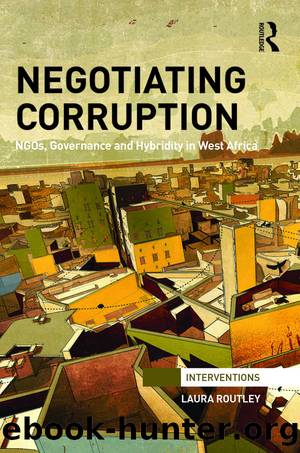Negotiating Corruption: Ngos, Governance and Hybridity in West Africa by Laura Routley

Author:Laura Routley [Routley, Laura]
Language: eng
Format: epub
Tags: International Relations, Political Science, General
ISBN: 9781317216247
Google: MZM0CwAAQBAJ
Goodreads: 33341566
Publisher: Routledge
Published: 2015-12-14T00:00:00+00:00
Locating the local
Whether practices are perceived as Western or local is often a stylistic judgement. Although substantively baseless, and shifting in how they are used (Yarrow 2008b: 237), these imaginaries of the local and the international remain productive. These imaginaries shape the landscape within which NGOs are understood as translators and intermediaries from the international to the local. This position is often the source of many of the criticisms of national NGOs, but it is also frequently seen to be their strength. National NGOs, therefore, may seek to flaunt their local embedded-ness to international funders whilst simultaneously parading their international connections at the local level, gaining status and legitimacy from both performances. For example, Maryâs international development agency utilised two of the NGOs I worked with to access rural communities, and WO (along with other NGOs) were seen to be the organisations to write a report for the UN on what was âreally going on, on the groundâ in Nigeria. Yet it was the connections to international funders which reassured traditional leaders and others that these organisations were âseriousâ.
The local often seems to slip through the fingers. The national NGOs I worked with come to seem not really local due to their international connections and funding, and traditional rulers lose their local authenticity due to their education, and frequently their residence in the city. Challinor narrates how the head of a local CBO explained why he would not want to expand to become a more national NGO, as funders preferred to fund his more local organisation. In fact, he said they would like in many cases to fund âthe peopleâ; ââBut âthe peopleâ do not existâ he concluded with a smileâ (Challinor 2005: 233).
Whilst âthe peopleâ may not exist this does not preclude the aspiration to fund them. There is an on-going desire to access the ârealâ local. This real local often stands in for the real âotherâ: the completely different, the completely subordinated, the subaltern. This close association of material deprivation and cultural difference â in other words, the convergence of poverty with tradition â has been highlighted by Ferguson, who proposes that sometimes âthe traditional African way of lifeâ is used as âa polite name for povertyâ (Ferguson 2006: 21). This is accompanied by a scalar imaginary, which Ferguson discusses as a vertical topography of power, in which the subordinate, the traditional, and the local come to be envisioned as at the bottom, at the grassroots.
we seem to hang on stubbornly to the very idea of a âbelowâ â the idea that politically subordinate groups are somehow naturally local, rooted, and encompassed by âhigher-levelâ entities. For what is involved in the very idea and image of âgrassrootsâ politics if not precisely the vertical topography of power that I have suggested is the root of our conceptual ills.
(Ferguson 2006: 107)
This topography of power is problematic in a number of ways. It centres many analyses on relationships that stretch âupwardsâ and âdownwardsâ. Discussions of the legitimacy and accountability of NGOs often utilise the distinction between âupwardâ and âdownwardâ accountability.
Download
This site does not store any files on its server. We only index and link to content provided by other sites. Please contact the content providers to delete copyright contents if any and email us, we'll remove relevant links or contents immediately.
Crazy Rich Asians by Kevin Kwan(9279)
Small Great Things by Jodi Picoult(7122)
Spare by Prince Harry The Duke of Sussex(5180)
Too Much and Not the Mood by Durga Chew-Bose(4338)
Machine Learning at Scale with H2O by Gregory Keys | David Whiting(4295)
Never by Ken Follett(3937)
Harry Potter 02 & The Chamber Of Secrets (Illustrated) by J.K. Rowling(3673)
I'll Give You the Sun by Jandy Nelson(3429)
Fairy Tale by Stephen King(3370)
The Ultimate Backcountry Survival Manual by Aram Von Benedikt; Editors of Outdoor Life;(3260)
Reminders of Him: A Novel by Colleen Hoover(3095)
The Man Who Died Twice by Richard Osman(3072)
Fantastic Beasts and Where to Find Them: Illustrated edition by J.K. Rowling & Newt Scamander(3023)
Will by Will Smith(2911)
The One Memory of Flora Banks by Emily Barr(2857)
Beautiful Disaster 01 by Jamie McGuire(2787)
Harry Potter and the Deathly Hallows (7) by J.K. Rowling(2714)
Never Lie: An addictive psychological thriller by Freida McFadden(2585)
Hooked: A Dark, Contemporary Romance (Never After Series) by Emily McIntire(2550)
